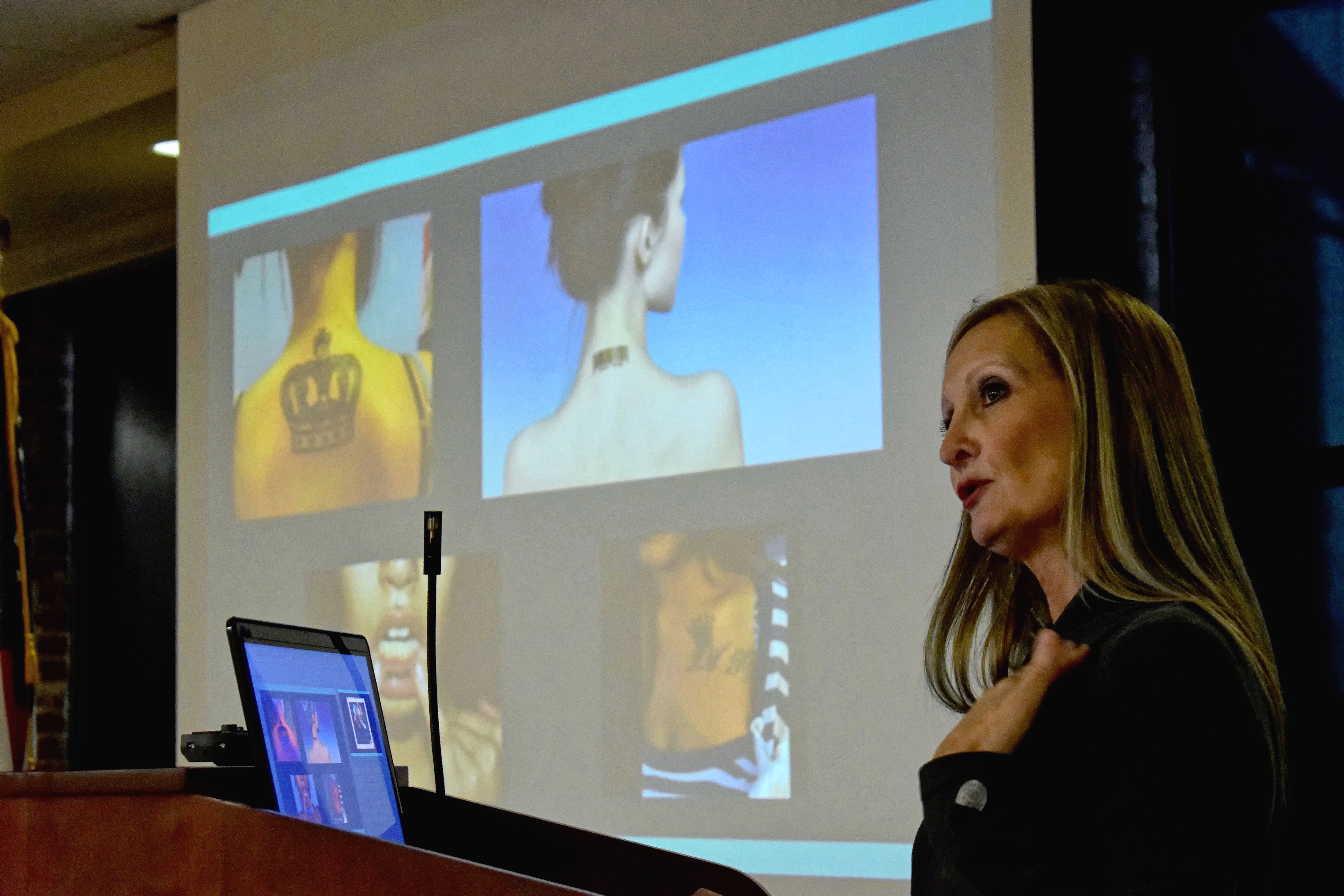Kathy Wilson displays tattoos commonly used to “brand” victims of trafficking. / W.C. Mann
CULLMAN – This week, employees of Cullman’s Hampton Inn met at the Cullman Area Chamber of Commerce office to be trained in recognizing and responding to human trafficking by Kathy Wilson, chairwoman of the Cullman County Human Trafficking Task Force. Hilton Worldwide, the international corporation that owns Hampton, recently enacted a policy requiring all of its hotel/motel employees to receive such training.
“It’s a first for me,” said Wilson. “I’m new at the hospitality industry, but, hopefully, together we’ll be able to work through and make a difference, to make them aware. (Human trafficking) is huge in the hotel industry, because that’s where (traffickers), for lack of a better word, ‘set up shop.’”
Human trafficking is defined by the Department of Homeland Security as “modern-day slavery and involves the use of force, fraud or coercion to obtain labor or commercial sex.” Victimization can take the forms of:
Sex Trafficking – Victims of sex trafficking are manipulated or forced to engage in sex acts for someone else’s commercial gain.
Forced Labor – Victims of forced labor are compelled to work for little or no pay, often manufacturing or growing the products we use and consume every day.
Domestic Servitude – Victims of domestic servitude are forced to work in isolation and are hidden in plain sight as nannies, housekeepers or domestic help.
Closer than you think
Is human trafficking really a problem in our area hotels? Try this on for size: according to Wilson, the task force recently hosted a former trafficking victim who came to speak to the group. While traveling through Cullman before the meeting, the speaker recognized and identified three hotels in the city to which she had been delivered at various times while she was trapped in “the life.”
Recognizing the signs
Wilson and the Cullman task force provided this training in partnership with the Department of Homeland Security’s Blue Campaign, which notes, “Traffickers often take advantage of the privacy and anonymity offered by the hospitality industry. They can operate discreetly because staff and guests may not know the signs of human trafficking. You may have employees who are victims of forced labor. If a third party applied for a position on behalf of an individual or if employees are not receiving their own paychecks, these could be signs of human trafficking. Hotels and motels are also major locations where traffickers force sex trafficking victims to provide commercial sex to paying customers. Victims may be forced to stay at a hotel or motel where customers come to them, or they are required to go to rooms rented out by the customers.”
In the training, Hampton Inn housekeepers, maintenance workers and room service staff were told to look for the following:
- “Do Not Disturb” sign being used constantly
- Requests for room or housekeeping services (additional towels, new linens, etc.), but hotel/motel staff being denied entry into room
- Refusal of cleaning services for multiple days
- Excessive amounts of cash in a room
- Smell of bodily fluids and musk
- Presence of multiple computers, cell phones, pagers, credit card swipes or other technology
- The same person reserving multiple rooms
- Individuals leaving room infrequently, not at all, or at odd hours
- Children’s items or clothing are present, but no child registered with the room
- Individuals loitering in hallways or appearing to monitor the area
- Excessive amounts of alcohol or illegal drugs in rooms
- Evidence of pornography
- Minors left alone in room for long periods of time
- Excessive number of people staying in a room
- Extended stay with few or no personal possessions
- Provocative clothing and shoes
- Constant flow of men into a room at all hours
- Excessive amounts of sex paraphernalia in rooms (condoms, lubricant, lotion, etc.)
- Rooms stocked with merchandise, luggage, mail packages and purses/wallets with different names
Front desk, security, and concierge staff were told to watch for:
- Patrons checking into room appear distressed or injured
- The same person reserving multiple rooms
- Few or no personal items when checking in
- Room paid for with cash or pre-loaded credit card
- Excessive use of hotel computers for adult oriented or sexually explicit websites
- Patrons not forthcoming about full names, home address or vehicle information when registering
- Minor taking on adult roles or behaving older than actual age (paying bills, requesting services)
- Patron appears with a minor that he or she did not come with originally
- Rentals of pornography when children are staying in the room
- Individuals dropped off at the hotel or visiting repeatedly over a period of time
- Individuals leaving room infrequently, not at all, or at odd hours
- Minor with a patron late at night or during school hours (and not on vacation)
- Individuals checking into room with no identification
- Room is rented hourly, less than a day, or for long-term stay that does not appear normal
- Patrons requesting information or access to adult services or sex industry
- Room rented has fewer beds than patrons
- Individuals selling items to or begging from patrons or staff
- Individuals enter/exit through the side or rear entrances, instead of the lobby
- Car in parking lot regularly parked backward, so the license plate is not visible
Food and beverage staff were told to look for:
- Patrons entertaining a minor at the bar or restaurant that they did not come in with originally
- Patron claiming to be an adult although appearance suggests he/she is a minor
- Individuals loitering and soliciting male patrons
- Individuals waiting at a table or bar and picked up by a male (trafficker or customer)
- Individuals asking staff or patrons for food or money
- Individuals taking cash or receipts left on tables
In presenting the signs, Wilson was careful to point out that one or two signs are not sufficient to prove criminal activity or evil intent. She encouraged the staffers to look for multiple signs and to “put the pieces together.”
What to do when the signs are there
According to the Blue Campaign, hospitality workers who recognize or suspect trafficking should do the following:
- Do not at any time attempt to confront a suspected trafficker directly or alert a victim to your suspicions.
- Call 9-1-1 for emergency situations—threats of violence, physical assault, emergency medical needs, etc.
- Follow your corporate protocol, such as by notifying management and security.
- Call 1-866-DHS-2-ICE (1-866-347-2423) to report suspicious criminal activity to federal law enforcement. Highly trained specialists take reports from both the public and law enforcement agencies. Submit a tip at www.ice.gov/tips.
- To get help from the National Human Trafficking Resource Center (NHTRC), call 1-888-373-7888 or text HELP or INFO to BeFree (233733).
Wilson expressed hope that this week’s training event was only the first of many.
Hampton Inn Manager Tabatha Smothers said, “Hopefully, the other hotels will get as interested.”
Wilson added, “That’s what I’m hoping: after they see this, that (Hampton) set a precedent, maybe they will.”
At the conclusion of the training session, Wilson offered the following words to the hotel staffers:
“What can you do to prevent human trafficking? What can you do? Gandhi once said, ‘Be the change that you wish to see in the world.’ There are many ways that each of us can become that change. I like to say, ‘Become a voice for the voiceless,’ because they don’t have a voice. Join our Task Force. We would love to have you join us; I always need volunteers . . . Spread the word; tell somebody that you know what you learned. Tell a family member, a coworker, someone at your church. It doesn’t matter who you tell; just be sure that you tell somebody, so they can educate themselves and that they can educate someone else.
“The more people who know that human trafficking exists here in our community, the more people that we have who will be watching out for our children. You’ve heard the saying, ‘It takes a village . . .’ It does. It takes a village; it takes everyone. We have the power to change history with our actions. Now is the time for all of us to take action, so we can stop this heinous crime from happening. And it’s up to us to do that. It’s up to each one of us. It’s time that we, as a community, are appalled that our children are being sold.”
For more information on the Department of Homeland Security’s Blue Campaign against human trafficking, visit www.dhs.gov/blue-campaign.
For more information about the Cullman County Human Trafficking Task Force, visit www.facebook.com/Cullman-County-Human-Trafficking-Task-Force or email endtrafficking25@gmail.com.
For more information on human trafficking in Alabama, visit www.enditalabama.org or www.stnow.org.
Copyright 2018 Humble Roots, LLC. All Rights Reserved.




















